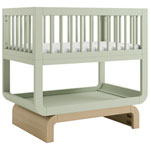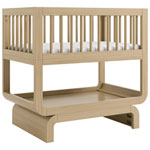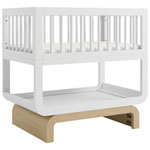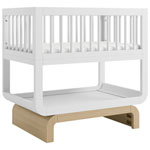Bassinets & Cradles
19 results
Bassinets & Cradles: Everything You Need to Know
Bassinets and cradles can make life with a newborn more convenient for you and safer for your little one. From simpler nighttime feedings to a lower risk of SIDS, there’s plenty of reasons why you might want to consider a baby bassinet or cradle instead of a crib. Not sure why or what to look for? Keep reading for a quick overview of the basics.
Why Use a Bassinet or Cradle Instead of a Crib?
To lower the risk of SIDS (Sudden Infant Death Syndrome), Health Canada recommends that newborns and infants sleep in a cradle, bassinet, or crib next to your bed until at least six months of age. For most of us, placing a full-size crib in the bedroom is next to impossible, let alone right beside the bed.
Bassinets and cradles, by contrast, are much smaller. They can be tucked right up alongside your bed, so you can easily reach in and hold baby’s hand or check on them in the middle of the night – all without leaving your bed. Having baby close by during the night also makes things like nighttime feedings and diaper changers easier (or as easy as possible).
Are Bassinets and Cradles Safe for Newborns?
Bassinets and cradles are made specifically for newborns and infants, but you should still make sure it meets certain safety requirements. For starters, bassinets and cradles made before September 1986 don’t meet Canadian safety regulations, so if you’re buying second-hand be sure to look for the date of manufacture.
Secondly, ensure the baby mattress is tight-fitting and firm. Newborns can accidentally roll onto their stomach in the night and not be able to roll back. If the mattress is too loose in the bassinet, or too soft, it’s a suffocation hazard.
Finally, be sure to follow all weight and height restrictions for the specific bassinet or cradle you choose. Each model will be slightly different and your little one will grow fast, so keep the limitations handy and check every few months.
Features to Consider When Choosing a Bassinet or Cradle
When it’s time to choose a bassinet or cradle for your little one, you’ll want to consider some of the following features. They can make your life easier and help your baby drift deeper into dreamland.
Rocking Movement
Some cradles come with motorized rocking or swinging functions, while others feature a base like a rocking chair, so you can gently rock-a-bye baby to sleep. For the sleep-deprived parent with an infant that wants to be lulled to sleep, this is a must-have feature.
Vibration
A built-in or optional vibration feature can also help soothe your little one into dreamland. Newborns are still accustomed to life in utero, with the ability to hear and feel mom’s breathing and heartbeat all around them. A slight vibration can help them feel safe and protected.
Wheels
Locking wheels on a bassinet or cradle lets you easily move it from room to room with minimal effort, including when baby is fast asleep. It also makes pulling the cradle right up to the side of your bed easy and smooth, so you don’t wake baby.
Canopy
You never want to cover a bassinet or cradle completely, since this can quickly overheat baby and dramatically increase the risk of SIDS. But a canopy helps minimize light and other distractions that might wake baby when they’re down for a nap or the night.






